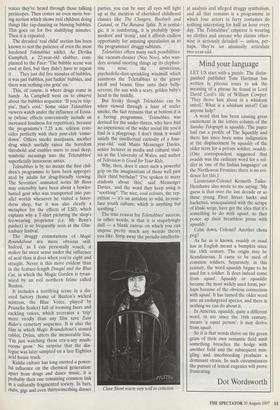Mind your language
LET US start with a puzzle. The distin- guished publisher Tom Hartman has written in piteous tones to ask the meaning of a phrase he found in Lord David Cecil's life of William Cowper: `They drove him about in a whiskum snivel.' What is a whiskum snivel? Can anyone help?
A word that has been causing great excitement in the letters column of the Sunday Telegraph is squaddy. The paper had run a profile of The Squaddy and there has since been some indignation at the displacement by squaddy of the older term for a private soldier, swaddy. (One correspondent suggested that swaddy was the ordinary word for a sol- dier in 'one of the Indian languages' on the North-west Frontier; there is no evi- dence for this.) Lieutenant-Colonel Kenneth Tulke- Henshawe also wrote to me saying: 'My guess is that over the last decade or so these young Fleet Street hacks and hackettes, unacquainted with the scrape of khaki serge, have got the idea that it's something to do with squad, so they ponce up their breathless prose with squaddy.'
Calm down, Colonel! Another chota peg?
As far, as is known, swaddy or swad has in English meant a bumpkin since the 18th century. The origin may be Scandinavian. It came to be used of common soldiers. Separately, in this century, the word squaddy began to be used for a soldier. It does indeed come from squad. Squaddy or squaddie became the most widely used form, per- haps because of the obvious connection with squad. It has turned the older word into an endangered species, and there is nothing we can do about it.
In America, squaddy, quite a different word, in use since the 16th century, means 'a squat person'; it may derive from squab.
So it is that words thrive on the green grass of their own semantic field until something breaches the hedge with another field and the subsequent min- gling and interbreeding produces a dominant strain. In such circumstances the pursuit of lexical eugenics will prove frustrating.
Dot Wordsworth


















































 Previous page
Previous page